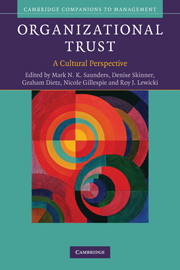Book contents
- Frontmatter
- Contents
- List of figures
- List of tables
- Note on editors
- Note on contributors
- Foreword
- Editors' acknowledgements
- Part I The conceptual challenge of researching trust across different ‘cultural spheres’
- Part II Trust across different ‘cultural spheres’: inter-organizational studies
- Part III Trust across different ‘cultural spheres’: intra-organizational studies
- Part IV Conclusions and ways forward
- 16 Emerging themes, implications for practice, and directions for research
- Index
- References
16 - Emerging themes, implications for practice, and directions for research
Published online by Cambridge University Press: 05 June 2012
- Frontmatter
- Contents
- List of figures
- List of tables
- Note on editors
- Note on contributors
- Foreword
- Editors' acknowledgements
- Part I The conceptual challenge of researching trust across different ‘cultural spheres’
- Part II Trust across different ‘cultural spheres’: inter-organizational studies
- Part III Trust across different ‘cultural spheres’: intra-organizational studies
- Part IV Conclusions and ways forward
- 16 Emerging themes, implications for practice, and directions for research
- Index
- References
Summary
Introduction
The conclusion summarizes the key findings presented within each section of the book, identifying the emerging patterns and themes across the conceptual contributions and empirical studies. These are considered in relation to our two initial questions. First, is there a universally applicable model of trust and trust development [etic], or do people from varying cultures understand and enact trust differently [emic]? And second, how can Party A from Culture #1 develop a trust relationship with Party B from Culture #2? We then highlight the implications of these patterns and themes for practitioners, and point to directions for future research.
We began this book with three vignettes that we believe highlight both the complexity and ordinariness of cross-cultural trust building in today's globalized business world. In the first vignette, we considered an Iranian businesswoman who is negotiating on behalf of her firm with male representatives from a German alliance partner; we particularly focused on the cultural implications for trust both within her own firm and between her firm and the German alliance partner. In the second vignette, we charted the trust relationship between a Dutch and an Irish employee representative, both engineers, working in and representing employees in Holland and England respectively, for an Anglo-Dutch firm during a period of considerable change, which culminated in the firm being bought by an Indian company.
- Type
- Chapter
- Information
- Organizational TrustA Cultural Perspective, pp. 407 - 423Publisher: Cambridge University PressPrint publication year: 2010
References
- 12
- Cited by

